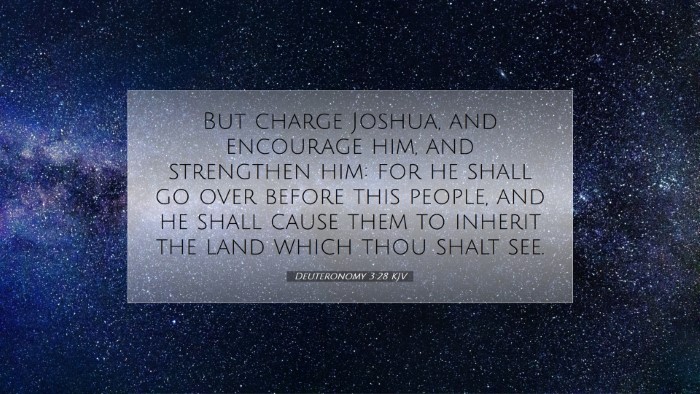Commentary on Deuteronomy 3:28
Deuteronomy 3:28 states: “But charge Joshua, and encourage him, and strengthen him: for he shall go over before this people, and he shall cause them to inherit the land which thou shalt see.” This verse takes place during a pivotal moment in Israel's journey through the wilderness, as Moses prepares to hand over leadership to Joshua. The command to Moses reflects not only the transition of authority but also the spiritual and emotional investment required to lead God’s people into the Promised Land. This commentary will explore the various dimensions of this verse as articulated by notable public domain commentaries, emphasizing its implications for leadership and theological insights into God’s promises.
1. The Context of Leadership Transition
Moses' Role: In Matthew Henry's commentary, the transition from Moses to Joshua is framed within the context of divine appointment. Moses, having led the Israelites for decades, was not only a political leader but a prophetic figure who mediated between God and the people. His impending inability to enter the Promised Land due to previous disobedience marked a significant turning point. Instead of despair, Moses takes the initiative to prepare Joshua, highlighting the importance of mentorship and discipleship in leadership.
2. Instruction to 'Charge' Joshua
Throughout the Old Testament, the term 'charge' is used to denote serious, authoritative commands. Albert Barnes notes that Moses is instructed to charge Joshua with both a moral and a strategic responsibility: to lead the Israelite people into the land that God promised. This might reflect the dual nature of a leader’s responsibility—both guiding them in faith and managing their practical needs.
2.1. The Significance of Encouragement
Adam Clarke emphasizes the psychological and spiritual dimensions of leadership. The command to encourage and strengthen Joshua underscores the challenges that lie ahead. It acknowledges that leadership often involves not just tactical skills but also moral and spiritual support. Clarke further elaborates that encouraging words can bolster Joshua's confidence, reminding us that leaders must cultivate resilience in themselves and others.
3. The Nature of Divine Promise
Deuteronomy 3:28 encapsulates the essence of God's promise to His people—the inheritance of the land. This notion is not merely physical but is also symbolic of spiritual rest and fulfillment. Henry draws parallels between the land of Canaan and the promises of rest and peace found in Christ, suggesting that just as Joshua would lead the Israelites to physical inheritance, Christ leads believers to a spiritual inheritance. This intertextual connection invites deeper theological reflection on the continuity of God's redemptive plan.
4. Implications for Contemporary Leadership
The passage has profound implications for modern pastors, students, and theologians. The act of charging and encouraging leaders reflects the communal nature of faith. As Barnes points out, leadership in the church context involves raising up others, investing in their spiritual maturity, and affirming their God-given call to ministry.
5. Theological Reflections
This verse also impels readers to reflect on the character of God as one who empowers His chosen leaders. Joshua's impending leadership serves as a reminder that God orchestrates transitions and prepares hearts for the work ahead. Clarke notes that God’s providence is evident in Joshua’s appointment, embodying the assurance that divine authority accompanies those He calls.
5.1. The Role of the Community
The communal aspect of leadership cannot be overstated. Moses did not simply send Joshua on his way; he was to encourage and strengthen him in the sight of the people. This act creates a foundation for community support, crucial for any leader's success. The importance of collective faith is a significant theme within scripture, suggesting that leaders are but one part of God’s plan, operating within a body of believers.
Conclusion
Deuteronomy 3:28, through the lens of public domain commentary, reveals much about the nature of leadership, divine promise, and the role of community in spiritual journeys. The transition from Moses to Joshua is emblematic of the ongoing call for leaders to encourage, guide, and strengthen one another as they fulfill God's mission. The elements of charge, encouragement, and divine inheritance run through this text, offering timeless principles for leadership that remain relevant in today’s church context.


